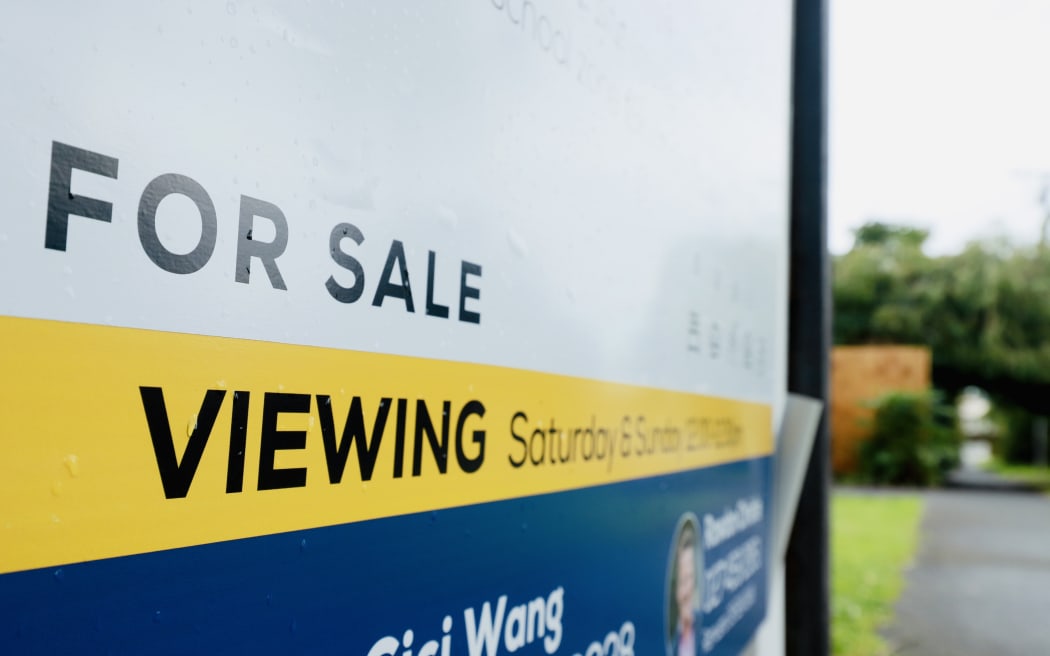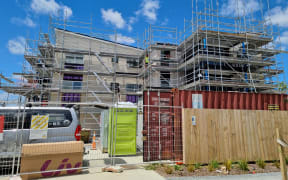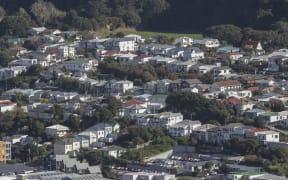
Central Otago was the region with the highest average asking price in New Zealand. Photo: RNZ / Marika Khabazi
Analysis - The housing market is reporting a bumper crop of offerings for the first time in almost a decade, and prices are still low. Here's what moved real estate this week.
House prices are rising at a much lower rate than the number of houses popping up for sale, and first-home buyers are swooping in.
They are slowly being followed by investors, who are seeing a light called interest deductibility at the end of the tunnel.
More houses for sale
The national average asking price was just under $887,000 - up $27,000 from March last year.
Central Otago was the region with the highest average asking price in the country, the latest Property Report by Real Estate New Zealand found.
The West Coast had the lowest average asking price, which surpassed the $500,000 mark last month for only the second time in 17 years.
The property market was very suppressed in 2023, with eight of the 12 months having the lowest listings on record for that month, realestate.co.nz spokesperson Vanessa Williams told Morning Report.
CoreLogic's House Price Index rose 0.5 percent in March, similar to January and February's muted gains, taking values 1.1 percent up over the first quarter of 2024.
"NZ's housing market can probably be described as 'not too hot, not too cold," CoreLogic NZ chief property economist Kelvin Davidson said.
The increase in listings in the first quarter had helped to take the heat out of price increases.
Interest rates, tax deductibility
However, Davidson said low prices, coupled with interest deductibility would not trump interest rates yet.
Landlords can again claim tax deductions for interest on residential investment properties, but experts aren't convinced it will lower rent prices.
From 1 April, landlords are able to write off 80 percent of their mortgage interest, and that will rise to 100 percent from April 2025.
The deduction scheme was removed by the previous government, and reinstating it was part of the coalition agreement between National and Act.
Davidson said although it would not necessarily decrease rent prices, it might slow their growth.
Property Investors Federation president Sue Harrison said it would be about two years until the benefits of interest deductibility began to trickle down - and whether rent increased, depended on interest rates.
The RBNZ has hinted that lower interest rates are on the horizon, but lower shorter-term fixed mortgage rates are not expected to drop much for another six to nine months.
The OCR - which is reviewed seven times a year - is next up for review on 10 April. It currently sits at 5.5 percent.
Inflation is at 4.7 percent.
The first quarter report by credit agency Centrix showed mortgage payment arrears rose 1.5 percent in February. There were 22,600 mortgage holders behind on their payments - the highest level since January 2020 - while mortgage applications were down 6 percent on the year earlier, reflecting a drop in sales volumes.
Building products shake-up, zoning changes
In a bid to make houses affordable, the government loosened the rules allowing builders to use overseas building products by just being able to rely on standards from trusted overseas jurisdictions.
Making the announcement on Thursday, Building and Construction Minister Chris Penk said it was currently about "50 percent more expensive to build a stand-alone house here than in Australia".
He said it was one of several changes, like the RMA, that would help housing affordability.
The building industry welcomed the move, but also sounded the alarm on the "risk of fraudulent activity" overseas that would need to be monitored.
This week, Prime Minister Christopher Luxon laid out a new "action plan" that includes 36 goals to be achieved by 30 June 2024.
It includes:
- Releasing a draft plan to ease restrictions on building materials from overseas for public consultation
- Take decisions to implement the Going for Housing Growth plan while making the medium density residential standards (MDRS) optional for councils.
- Respond to the independent review of Kāinga Ora's financial situation, procurement, and asset management.
- Introduce legislation to improve the rental market.
An Auckland University study found the Auckland Unitary Plan improved housing affordability.
indicated that about 22,000 new homes consented between 2016 and 2021 can be directly attributed to the Auckland Unitary Plan.
Implemented in 2016, the unitary plan allowed for about 400,000 new homes to be built across the region.
Public housing
Community housing providers are putting the brakes on building desperately needed homes because there's no guarantee of government funding after June next year.
The government pays rent subsidies to community housing providers, which they rely on to operate.
But the funding is soon to dry up, leaving providers in the lurch, delaying construction on consented land that's ready to build.






